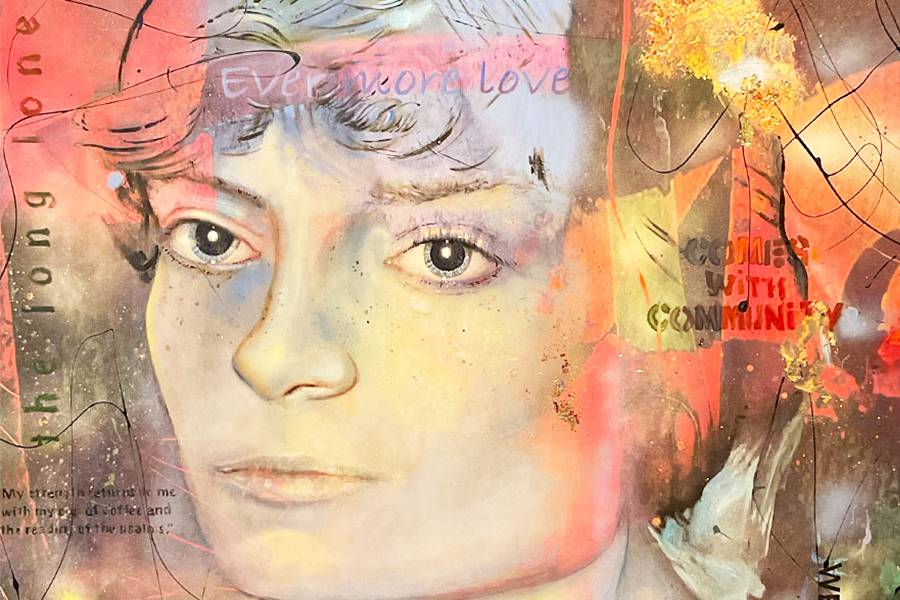
125 years since her birth, Dorothy Day remains integral to faith and justice at Xavier
Nov 7, 2022
Tuesday marks the 125th birthday of Dorothy Day, the trailblazing activist whom Pope Francis has hailed for her "passion for justice and for the cause of the oppressed.”Day is most known for founding the Catholic Worker newspaper, which inspired an eponymous movement rooted in pacifism and works to help marginalized people around the world. Today, the Catholic Worker movement consists of nearly 190 communities around the world that carry on Day’s spirit with their commitment to nonviolence, voluntary poverty, prayer, and hospitality for the homeless, exiled, hungry, and forsaken.
Though we are more than four decades removed from her death in 1980, Day’s legacy remains strongly intact at Xavier University. As the namesake of Xavier’s Dorothy Day Center for Faith and Justice (CFJ), Day’s legacy stands out as boldly unique relative to some of her Catholic contemporaries and predecessors.
After living what many would call a Bohemian lifestyle in her early life, she converted to Catholicism at age 30 following the birth of her daughter and, from then on, remained devout in her faith. At the age of 75, Day was arrested with Cesar Chavez in support of the United Farm Workers’ movement in California.
She considered herself a radical and, though there is currently momentum to have her canonized as a saint, famously scoffed at the thought, purportedly declaring, “Don't call me a saint. I don't want to be dismissed that easily."
Through her willingness to stand up for the oppressed and against harmful institutions, Day’s legacy continues to inspire Xavier students today, regardless of whether they are Catholic.
"Particularly when we think about our tradition, the Catholic Worker tradition brings alive the concept of faith and justice and is a place where even some of our students who are not Catholic really feel inspired or compelled by Dorothy's legacy,” said the Rev. Abby King-Kaiser, director of the CFJ. “Sometimes she can be an entry point for students who aren’t Catholic into understanding Xavier’s Catholic identity.”
The center’s name speaks directly to what Day believed, which is that faith and justice go hand-in-hand. The CFJ challenges and supports students as they deepen their spiritual lives, pursue justice and promote pluralism.
In a senior essay, Class of 2021 Xavier alumnus Jonathon Hesford described this complementary nature of faith and justice, informed by Day and the center’s teachings.
“I am a Christian, it is my core. And it is absolutely, without exception, necessary that justice follows from this,” Hesford wrote. “Christianity is not a particular action, mindset, doctrine, body, or religion … It is a relationship with a God that permeates and affects every aspect of a being, the ultimate concern. Because of this it feels very much like I have no choice. I have to pursue justice because if I don’t, it goes against what I know to be true about the demands of the Christian moral life.”
Hesford’s essay embodies another approach from Day in that Catholicism was not meant to be theoretical – she believed strongly that faith was about action.
One way her spirit can be seen today is through the CFJ’s service programs, which are deeply rooted in both relationships and understanding the need for systemic change.
“It was vital to her and is to the Catholic Worker to be in those spaces and at the margins, so I think our students who are opting into service programs in Cincinnati or into spending their breaks doing service and reflection and education is, to me, exciting for Dorothy,” said Shannon Hughes, the CFJ’s senior assistant director for service and justice.
Additionally, Hughes said she thinks Day would be happy about the prominence of faith spaces on campus, including Bellarmine Chapel.
“I also think she would be excited that the chapel is at the center of campus and that there are faith spaces that are open and available at all hours of the day and night. That was important to her.”
Another way in which students can become intimately acquainted with Day’s example is through CFJ’s Dorothy Day Immersions program, which provides students short-term opportunities to live, work, and reflect at the margins. Past trips brought students to cities such as St. Louis, Baltimore, Washington D.C., New York, Chicago and New Orleans.
These immersions often provide opportunities for students to connect with Catholic Worker communities, directly exposing students to the movement’s firm commitment to faith and justice.
Experiencing that lifestyle firsthand often makes a profound impact on students, said Colleen Ryan Mayrand, the CFJ’s assistant director for Catholic student outreach and retreats.
“Dorothy is such an inspiring and challenging person,” she said. “Every time I read her work, I think, ‘I need to change something in my life,’ or I’ll hang out with Catholic Workers, and it's inspiring and challenging, just like Jesus was.
“I think watching those folks and how they encounter the poor and just ask hard questions all the time, it inspires our students to do that too. That's what we do here. We ask hard questions, we expose them to things, show them that the world could be different, but there's always more to do.”
As the community honors Day’s 125th birthday, learn more about how CFJ carries on her legacy.